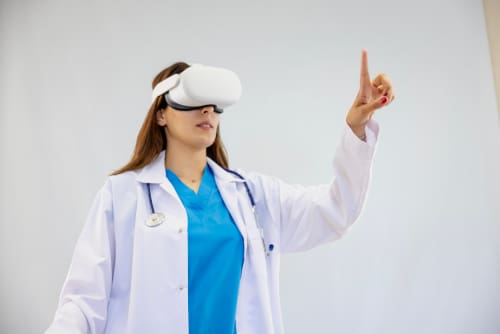In recent years, the healthcare industry has witnessed a significant transformation with the rise of telehealth. This revolutionary approach to healthcare delivery has not only changed how patients receive care but has also opened up new opportunities for healthcare professionals, particularly nurses. Let’s explore how nurses are at the forefront of the telehealth revolution, providing virtual care and the exciting prospects this presents for their profession.
The Rise of Telehealth
Telehealth, the use of digital information and communication technologies to access healthcare services remotely, has been on the rise, especially accelerated by the COVID-19 pandemic. The need for social distancing and the overwhelmed healthcare facilities prompted a rapid adoption of telehealth solutions. This shift has allowed patients to receive medical care from the comfort of their homes, reducing the need for in-person visits and minimizing the risk of virus transmission.
A Brief History of Telehealth
The concept of telehealth is not new. It dates back to the early 20th century when telecommunication technologies began to be used in healthcare. Here’s a brief overview of its evolution:
- Early Beginnings: In the 1920s, radio technology was used to provide medical advice to ships at sea. This was one of the earliest instances of telehealth, allowing maritime travelers to receive medical guidance remotely.
- Advancements in the 1960s and 1970s: With the advent of television and satellite communications, telehealth took significant strides. The National Aeronautics and Space Administration (NASA) played a crucial role in developing telemedicine to monitor astronauts’ health in space. Concurrently, remote consultations began in remote areas and underserved communities, using video conferencing technology.
- The Internet Era: The 1990s saw the rise of the internet, which revolutionized telehealth by enabling more sophisticated and widespread remote consultations. Email, online chats, and early video conferencing tools allowed healthcare providers to connect with patients more efficiently.
- Modern Telehealth Technologies: Today, telehealth leverages advanced technologies such as high-definition video conferencing, mobile health applications, wearable health devices, and cloud-based health records. These innovations have made telehealth more accessible, reliable, and comprehensive, providing a seamless healthcare experience for patients and providers alike.

The Role of Nurses in Telehealth
Nurses play a pivotal role in the telehealth landscape, leveraging their expertise to provide comprehensive care virtually. Here are some of the key ways nurses are contributing to telehealth:
Virtual Consultations
Nurses conduct virtual consultations, offering patients advice, follow-up care, and health assessments through video calls or phone calls. This ensures that patients continue to receive the necessary care without the need to visit healthcare facilities.
Remote Monitoring
Through telehealth platforms, nurses can monitor patients’ vital signs and health conditions remotely. Devices such as blood pressure monitors, glucose meters, and wearable health trackers send data directly to healthcare providers, allowing nurses to keep a close eye on patients’ health.
Patient Education and Support
Nurses use telehealth to educate patients about their conditions, medications, and lifestyle changes. They provide valuable support and guidance, helping patients manage chronic diseases and promoting healthier living.
Triage and Care Coordination
Telehealth enables nurses to triage patients, determining the urgency of their conditions and directing them to appropriate care. They also coordinate care by collaborating with other healthcare professionals, ensuring a seamless patient experience.
Opportunities for Nurses in Telehealth
The expansion of telehealth presents numerous opportunities for nurses, enhancing their roles and opening new career paths. Here are some of the benefits:

- Increased Accessibility: Telehealth allows nurses to reach patients in remote or underserved areas, bridging the gap in healthcare accessibility. This is particularly beneficial for patients with limited mobility or those living in rural regions.
- Flexible Work Environment: Telehealth offers nurses more flexible working conditions. They can provide care from various locations, including their homes, which can improve work-life balance and reduce burnout.
- Skill Development: Engaging in telehealth requires nurses to develop new skills in technology and digital communication. This skill set can enhance their professional growth and open doors to advanced roles in healthcare technology and administration.
- Expanded Career Opportunities: The demand for telehealth services has created new job opportunities for nurses, such as telehealth coordinators, remote care managers, and virtual care specialists. These roles offer competitive salaries and the chance to be part of an innovative healthcare frontier.
The Future of Nursing in Telehealth
As telehealth continues to evolve, the role of nurses will become even more integral to its success. Advancements in technology, such as artificial intelligence and remote diagnostics, will further enhance the capabilities of telehealth, allowing nurses to provide even more sophisticated care. Additionally, ongoing training and education in telehealth will be crucial in preparing the next generation of nurses for this dynamic field.
The Role of Nursing Informatics
Nursing informatics, which combines nursing science, analytics, an information science, will take on a more crucial role with the growth of telehealth. The goal is to quickly provide doctors and clinicians with accurate patient data and enhance patient-centered care and outcomes.
Here are some key areas where nursing informatics will play a growing role in telehealth:
- Artificial Intelligence (AI) and Big Data: AI and big data analytics can enhance decision support systems, improving infection detection during pandemics and aiding in contact tracing and population health response.
- Assisted Living and Smart Home Technologies: Motion sensing and monitoring systems help tailor care for elderly individuals, particularly those with memory issues.
- Electronic Health Records (EHRs): EHRs surpass paper documentation in terms of data completeness, structure, and legibility.
- Mobile Health: Mobile health applications enhance immediate patient outcomes and facilitate continuous communication between patients and providers. Nurses’ input is vital in developing guidelines and integrating these apps with other healthcare technologies.
- Virtual Reality (VR) and Augmented Reality (AR): VR and AR are effective tools for nursing education and clinical interventions. Nurses’ participation in developing affordable and compatible devices is essential.

In conclusion, the telehealth revolution is transforming healthcare delivery, and nurses are at the heart of this change. By embracing telehealth, nurses are not only enhancing patient care but also seizing new opportunities for professional growth and development. As we move forward, the integration of telehealth into everyday healthcare practices will continue to expand, making it an exciting time to be a nurse in this digital age.

